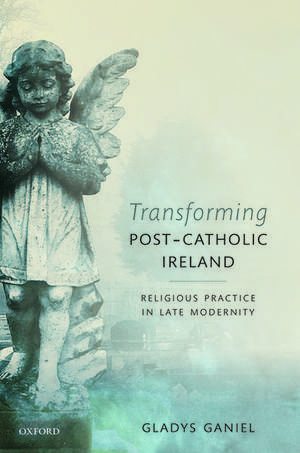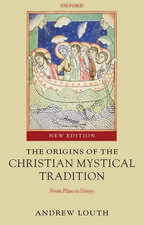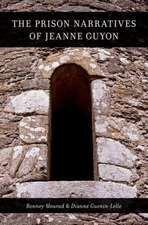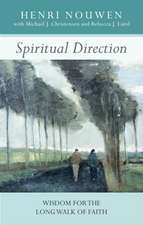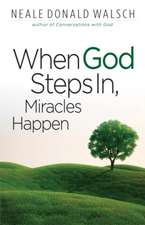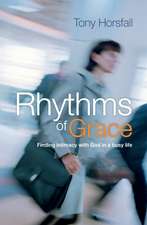Transforming Post-Catholic Ireland: Religious Practice in Late Modernity
Autor Gladys Ganielen Limba Engleză Hardback – 25 feb 2016
Preț: 613.66 lei
Preț vechi: 880.18 lei
-30% Nou
Puncte Express: 920
Preț estimativ în valută:
117.42€ • 127.95$ • 98.95£
117.42€ • 127.95$ • 98.95£
Carte tipărită la comandă
Livrare economică 14-19 aprilie
Preluare comenzi: 021 569.72.76
Specificații
ISBN-13: 9780198745785
ISBN-10: 0198745788
Pagini: 284
Dimensiuni: 178 x 240 x 23 mm
Greutate: 0.56 kg
Editura: OUP OXFORD
Colecția OUP Oxford
Locul publicării:Oxford, United Kingdom
ISBN-10: 0198745788
Pagini: 284
Dimensiuni: 178 x 240 x 23 mm
Greutate: 0.56 kg
Editura: OUP OXFORD
Colecția OUP Oxford
Locul publicării:Oxford, United Kingdom
Recenzii
...I highly recommend this book. The research is excellent and Ganiel's voice comes through strongly, I feel, gently, but firmly guiding the sometimes surprised reader through much unfamiliar territory.
In this insightful and intelligent book, Gladys Ganiel suggests that we think of Ireland as post-Catholic. In doing so, she does not argue that there is nothing left of the Catholic Church or Catholicism in Ireland, but rather that the type of legalistic, authoritarian institutional religion that was dominant up until the 1970s has almost disappeared... However, in Ganiel's terms, as well as these traditional types, there are also new alternative and creative Catholics. All that was solid about the Catholic Church has not melted into air but has fragmented into vibrant, dynamic new forms. It is these new forms of what she calls extrainstitutional religion that she sets out to describe and analyse.
Ganiel's book makes a novel contribution to the study of religion by presenting new understandings of the dynamics of religious change and the different forms of extra-institutional religion...The book will be of a significant interest to students and scholars in theology, religious studies, sociology and anthropology of religion, and other disciplines that study religious changes. In addition, it will also be of appreciable use to many practitioners, including religious leaders and laypeople.
[It] represents a key contribution to our understanding of religious change and development. What I found most appealing about this book is the narrative skill, imagination, and keen observation of the author. And so this book will appeal not just to social scientistsâsociologists of religion primarily--but to non-specialists and non-academics as well ... this is a superb book for students of religion.
Transforming Post-Catholic Ireland should have wide appeal for not only scholars of religion in Ireland and Europe, but in keeping with her commitment to action research, for journalists, religious leaders and communities, and political and social sector leaders as well. It is action research at its best, exposing areas deeply in need of evaluation and reform while highlighting areas of strength to draw upon for social transformation.
Some will rejoice in the fall from grace of one of Irelands traditionally most revered institutions, others will regret it, but wherever one stands on the issue, what this book shows clearly is that Catholicism has not gone away but has mutated into something different that could yet prove to be transformative and lasting.
In this insightful and intelligent book, Gladys Ganiel suggests that we think of Ireland as post-Catholic. In doing so, she does not argue that there is nothing left of the Catholic Church or Catholicism in Ireland, but rather that the type of legalistic, authoritarian institutional religion that was dominant up until the 1970s has almost disappeared... However, in Ganiel's terms, as well as these traditional types, there are also new alternative and creative Catholics. All that was solid about the Catholic Church has not melted into air but has fragmented into vibrant, dynamic new forms. It is these new forms of what she calls extrainstitutional religion that she sets out to describe and analyse.
Ganiel's book makes a novel contribution to the study of religion by presenting new understandings of the dynamics of religious change and the different forms of extra-institutional religion...The book will be of a significant interest to students and scholars in theology, religious studies, sociology and anthropology of religion, and other disciplines that study religious changes. In addition, it will also be of appreciable use to many practitioners, including religious leaders and laypeople.
[It] represents a key contribution to our understanding of religious change and development. What I found most appealing about this book is the narrative skill, imagination, and keen observation of the author. And so this book will appeal not just to social scientistsâsociologists of religion primarily--but to non-specialists and non-academics as well ... this is a superb book for students of religion.
Transforming Post-Catholic Ireland should have wide appeal for not only scholars of religion in Ireland and Europe, but in keeping with her commitment to action research, for journalists, religious leaders and communities, and political and social sector leaders as well. It is action research at its best, exposing areas deeply in need of evaluation and reform while highlighting areas of strength to draw upon for social transformation.
Some will rejoice in the fall from grace of one of Irelands traditionally most revered institutions, others will regret it, but wherever one stands on the issue, what this book shows clearly is that Catholicism has not gone away but has mutated into something different that could yet prove to be transformative and lasting.
Notă biografică
Dr Gladys Ganiel is Research Fellow in the Institute for the Study of Conflict Transformation and Social Justice at Queen's University Belfast. She is author of The Deconstructed Church: Understanding Emerging Christianity (with Gerardo Marti), Evangelical Journeys: Choice and Change in a Northern Irish Religious Subculture (with Claire Mitchell), and Evangelicalism and Conflict in Northern Ireland.
